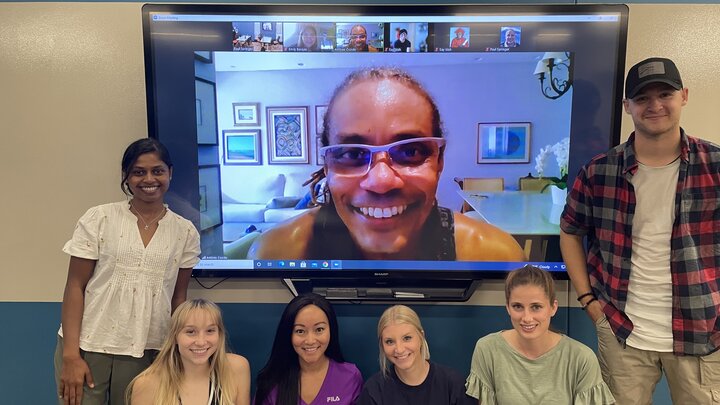If one is looking for silver linings of the pandemic, the creative approaches used in education has to make the list. Technology allowed students and teachers to stay connected, apply new methods for teaching and learning, and help students experience the world right in their own backyard through global experience programs.
While study abroad travel was prohibited during the pandemic, the University of Nebraska–Lincoln offered a series of summer classes at half the regular tuition rate as a way to provide students global experiences without international travel. 25 experiences were offered campus wide, including six in the College of Education and Human Sciences
“The Exploration of Brazil: The Impact of Systemic Racism on Families, Schools and Communities,” was one course offered by the college during the summer 2021. Instructed by Paul Springer, professor in the Department of Child, Youth and Family Studies , the course was an immersive experience focused on understanding the cultural diversity of Brazil from an Afro-Brazilian perspective.
“I wanted to create a course that would invite students to be vulnerable and have cultural interactions with families, students, religious leaders, and artists so they could fully experience Brazil as if they were in the country with me,” said Springer. “This required that I creatively integrate experiential learning activities such as dance classes, sampling of indigenous dishes, spending time with virtual host families and taking virtual tours in Salvador to counterbalance the challenging lectures and conversations we were having around the topic of systemic racism, colorism, affirmative action and Brazil’s enslaved past.”
It was this balance of hands-on activities and lectures from experts in Brazil that made this course such a fertile ground for trust and self-growth.
“I absolutely loved the relationship that this program allowed me to build with my Brazilian adoptive mother and her family,” said Emika Du, master’s student in Educational Psychology . “In my view, the joy that these interactions brought me, and the other students was a meaningful and welcome method of counterbalancing how difficult our discussions on racism, misogyny, oppression and violence could be at times.”
For many students, this was the first time that they explored the topic of racism from a global context. Aiswary Ganapathy Devendra Rajan a master’s student in the marriage and family therapy program at Nebraska was born and raised in Kuala Lumpur, Malaysia and moved to the U.S. in 2017. She took this course as an opportunity to learn more about racial issues in Brazil and the U.S., and her own journey and relationship with her culture.
“This course is interesting. I have thought more about my culture, race and identity before and how that affects my day-to-day life,” Rajan said.
Say Way, a freshman emerging media arts student summed up the importance of approaching a culturally immersive course with curiosity and an open mind.
“This course will require you to be open-minded, to be uncomfortable, to have discourse, to agree and disagree, but also challenge you to think critically about the things you are learning from the vibrant and various speakers who will meet with you.”
Although pandemic restrictions have loosened and students are now able to study abroad, this course “CYAF 442a/882a Exploration of Race, Culture, Families Communities and Schools in Vibrant Brazil will be offered during the second summer five-week session in 2022. For students who wish to learn more and register, login to MyRed.
College of Education and Human Sciences
Child, Youth and Family Studies
CEHS Global Experiences




